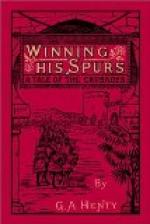“What are your plans?” the knight asked Sir Cuthbert that night, as they sat by the fire of the hostelry. “I would warn you that the town which you will first arrive at is specially hostile to your people, for the baron, its master, is a relation of Conrad of Montferat, who is said to have been killed by order of your king.”
“It is false,” Cuthbert said. “King Richard had appointed him King of Jerusalem; and, though he liked him not, thought him the fittest of those there to exercise sovereignty. He was the last man who would have had an enemy assassinated; for so open is he of disposition, that he would have fought hand to hand with the meanest soldier of his army, had he desired to kill him.”
“I doubt not that it is so, since you tell me,” the knight said courteously. “But the people here have taken that idea into their minds, and it will be hard to disabuse them. You must therefore keep up your disguise as a French knight while passing through this neighbourhood. Another week’s journeying, and you will reach the confines of Saxony, and there you will, as you anticipate, be safe. But I would not answer for your life were you discovered here to be of English birth. And now tell me if there is aught that I can do for you. I will myself accompany you into the town, and will introduce you as a French knight, so that no suspicion is likely to lie upon you, and will, further, ride with you to the borders of Saxony. I am well known, and trust that my company will avert all suspicion from you. You have told me that your purse is ill-supplied; you must suffer me to replenish it. One knight need not fear to borrow of another; and I know that when you have returned to your home, you will bestow the sum which I now give you upon some holy shrine in my name, and thus settle matters between us.”
Cuthbert without hesitation accepted the offer, and was well pleased at finding his purse replenished, for its emptiness had caused him serious trouble. Cuthbert’s steed was led by one of the archers, and he himself walked gaily alongside of Sir Ernest, followed by his retainers. Another long day’s march brought them down to Innsbruck, where they remained quietly for a week. Then they journeyed on until they emerged from the mountains, crossed the Bavarian frontier, and arrived at Fussen, a strong city, with well-built walls and defences.
They at once proceeded to the principal hostelry, where the young baron was well known, and where great interest was excited by the news of the narrow escape which he had had from the attack of the wolves. A journey across the Alps was in those days regarded as a very perilous enterprise in the winter season, and the fact that he should have been rescued from such a strait appeared almost miraculous. They stayed for two days quietly in the city, Cuthbert declining the invitation of the young noble to accompany him to the houses of his friends, as he did not wish that any suspicion should be excited as to his nationality,




